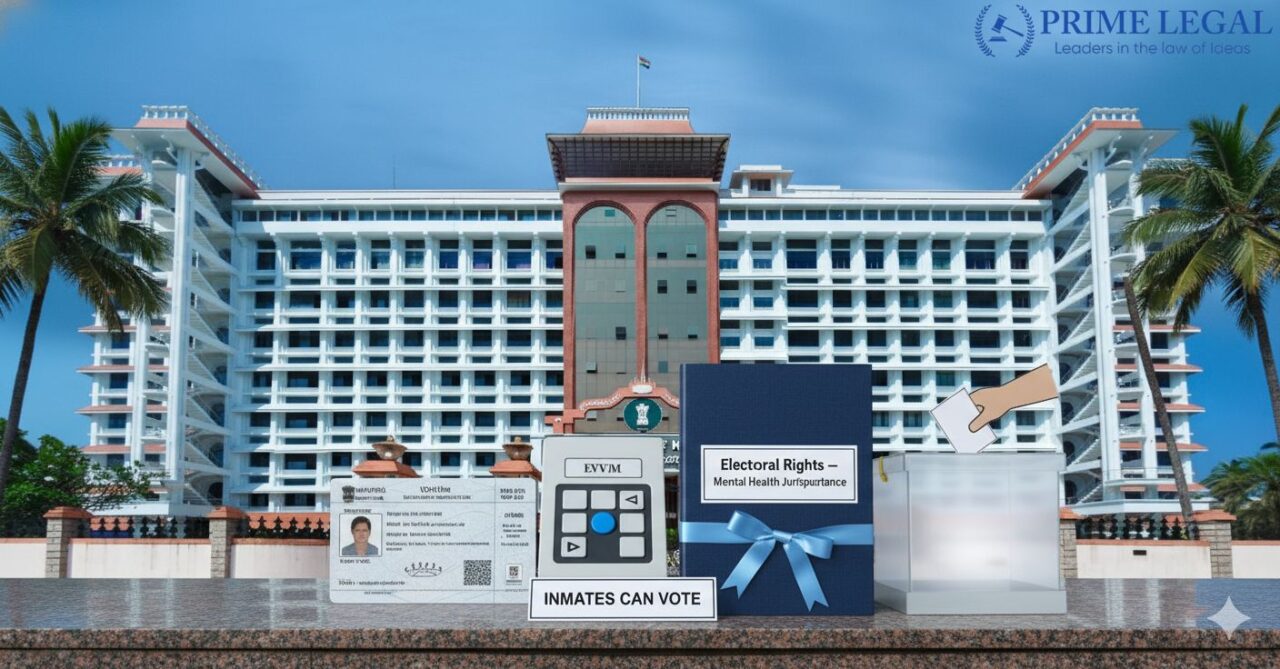CASE NAME: Jomon Jacob & Anr. V. State Election Commission & Ors.
CASE NUMBER: WP(C) NO. 42170 OF 2025
COURT: High Court Of Kerala, Ernakulam
DATE OF JUDGEMENT: Thursday, Thirteen November, Two Thousand Twenty-Five
QUORUM: Honourable Mr. Justice P.V.Kunhikrishnan
FACTS
The Petitioners are permanent residents of Ward No.7 of Pala Municipality challenged the inclusion of around 60 individuals in the final voter’s list, asserting that these persons were the residents of “Mariya Sadhanam” a rehabilitation centre for individuals with mentally challenged persons. They claimed that the voters listed from 349-358 and 360-407 were mentally challenged, not permanent residents of the ward, and unable to cast votes according to their will.
The petitioners approached authorities seeking deletion of these names, alleging procedural lapses in the preparation of electoral rolls. When no favourable action followed they filed the present writ petition seeking, to place these voters in a separate electronic voting machine, order or direction directing the respondents to record the votes of voters from 349 to 358 and 360 to 407 digitally at the time of cast their votes and keep the same in a safe custody, award costs and any other relief this Hon’ble Court deems fit.
ISSUES
- Whether persons alleged to have mental illness can be treated as a separate class of voters for the purpose of election.
- Whether the writ was maintainable in the absence of impleading affected voters or the rehabilitation centre.
- Whether mental illness or residence in a rehabilitation centre constitutes a disqualification from being included in the electoral roll.
LEGAL PROVISIONS
- Kerala Municipality Act, 1994: Section 74(1)(b)
- Mental Healthcare Act, 2017: Section 2(s), 3, 4.
ARGUMENTS
Petitioners: The petitioners argued that the voters in question were “mentally challenged” individuals residing in a rehabilitation centre and were incapable of exercising an informed electoral choice. They contended that these names were wrongly included in the voter’s list due to inadequate inquiry and must therefore be segregated during voting to ensure fairness. They pointed out to their prior representations to authorities which elicited no action.
Respondents: The respondents contended that the affected persons were not made parties to the writ petition, either personally or through a fit person, the centre as well was not made a party. No materials or evidence was shown that the individuals of the voter’s list were suffering from mental illness or had been declared as “unsound mind” by a competent court. Under Section 74(1)(b) of the Kerala Municipality Act, 1994, a person is only disqualified for registration in an electoral roll if they are of unsound mind and have been so declared by a competent court. The Mental Care Act, 2017, presumes that every person including a person with mental illness, has the capacity to make decisions regarding their mental care or treatment provided they meet certain criteria. They asserted that the petition was based on assumptions and amounted to stigmatizing a vulnerable community.
ANALYSIS
The Court underscored the mental illness is a sensitive matter and that the individuals with such conditions are entitled to dignity and constitutional right noting that 74(1)(b) of the Kerala Municipality Act allows disqualification from the electoral roll only when a competent court declares a person of unsound mind, something the petitioners failed to show. It further stressed that the Mental Healthcare Act, 2017 presumes decision making capacity for all persons, and mental illness can be determined only through recognized medical standards meaning residence in a rehabilitation centre cannot justify labelling someone as mentally ill. The petitioners had also not impleaded any of the concerned voters or the rehabilitation centre making the petition fundamentally defective. The Court held that deciding the matter without hearing those affected would violate natural justice and insult their dignity and that the respect to segregate their voters were discriminatory, unconstitutional and grounded on mere assumption, ultimately reinforcing that such treatment would only intensify stigma and contradict legislative intent.
JUDGEMENT
The Kerala High Court, dismissed the writ petition holding that, the petition was flawed for non-impleadment of necessary parties. The Court as well observed that there was no evidence of mental illness or any judicial declaration of unsoundness, also the petitioner’s prayer to segregate the voters were discriminatory. The High Court also stated that mental illness is not a disqualification of voting and such persons must be embraced within democratic process. While the Court found the petition meritless and capable of attracting heavy costs, it refrained them from imposing since the matter was dismissed at the admission stage.
CONCLUSION
The judgement reaffirms that voting is a constitutional right that cannot be restricted based upon unproven claims of mental illness, emphasizing dignity, equality, and inclusion of person with mental illness condition. By insisting that only a judicial declaration of unsoundness can disqualify a voter highlighting the statutory presumption of decision making capacity the Court firmly protects vulnerable individuals from discrimination in electoral participation.
“PRIME LEGAL is a full-service law firm that has won a National Award and has more than 20 years of experience in an array of sectors and practice areas. Prime legal falls into the category of best law firm, best lawyer, best family lawyer, best divorce lawyer, best divorce law firm, best criminal lawyer, best criminal law firm, best consumer lawyer, best civil lawyer.”
WRITTEN BY- SOUMITA CHAKRABORTY
Click here to read more: Jomon Jacob & Anr. V. State Election Commission & Ors.


